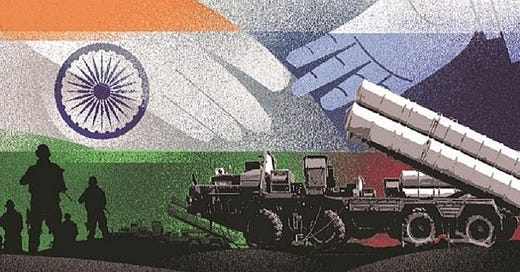The BrahMos Chief Confirmed That Russia Will Always Be India’s Top Military-Technical Partner
Russia’s continued status as India’s top military-technical partner is to Delhi’s indisputable advantage since it provides that globally significant Great Power with reliable access to cutting-edge equipment, unparalleled technology transfers, and helps maintain the balance of power with China in a “friendly”/“gentle”/“non-hostile” way that avoids inadvertently worsening their security dilemma.
BrahMos Aerospace Indo-Russian Joint Venture Managing Director and CEO Atul Dinkar Rane shared some very powerful remarks with Russia’s publicly financed international media flagship TASS on Wednesday that complemented those from Russian Ambassador to India Denis Alipov a few days back. Moscow’s top diplomat in Delhi told a forum last weekend that “[the US offers] Nothing near the level of advanced technology transfer (to India) we do offer. What the US is good at though is advertising”.
Rane went even further by effusively praising the unprecedented military-technical closeness between these decades-long special and privileged Great Powers. In order to fully appreciate everything that he said, TASS’ report of his powerful words will now be shared below before being analyzed:
“My personal gut feeling (about whether the West will stop the Russia-India defense partnership) – it is never! And if someone tries, he will only fail…The relationship between the Indian scientists and Russian technologists is so deep right now that it’s not going to be possible to break it. Even if someone tells us by law — no more talking with Russia, you will start talking to someone else — but we’ll always say it was easier to work with the Russians.
The trust which we have developed between the two partners, … that trust is good enough for us to work, and we are working forward - despite all these sanctions. There are problems but these problems we have been able to manage by discussion and seeing how to work on them. We have no problems in the supply chains, we have no problems in discussing, there are no problems in traveling and talking to each other.”
As can be seen, there’s no doubt that the BrahMos chief is convinced that Russia will always be his country’s top military-technical partner. They’ve weathered thick and thin together over the years, especially the last one where India faced unprecedented US pressure to distance itself from Russia.
The only problem that Rane appears to be hinting at is facilitating payments between those two in light of America’s financial sanctions, but this isn’t insurmountable and both sides are working closely to resolve it as soon as possible. In fact, it can even be said that the speculative existence of this problem reaffirms the strengthen of their strategic partnership since Russia still plans to complete its dispatch of S-400s to India sometime soon according to Ambassador Alipov in spite of this potential hurdle.
This observation goes to show how much Russia trusts India that it would carry on with their plans in spite of possible problems with receiving payments for these state-of-the-art air defense systems. It’s unimaginable that any other country, especially the US, would ever do what Russia just did. They don’t trust their partners as much as Russia trusts India, which is why they’d never continue delivering untold sums’ worth of cutting-edge equipment without first having resolved financial challenges.
Not only that, but Ambassador Alipov also rightly noted that the US doesn’t offer India anywhere near the level of advanced technology transfer that Russia does, which is another point in favor of Rane’s prediction that Russia will always remain India’s top military-technical partner. Apart from these practical reasons that were just explained, there’s also a strategic dimension to their aforementioned ties that gives further weight to the argument being made in this analysis.
If India were to theoretically replace Russia’s role in the military-technical sphere with a collection of Western countries after some decades (seeing as how it’s literally impossible to do this anytime soon), then tensions with China would uncontrollably spike because Beijing would regard Delhi as a US proxy. From the perspective of the People’s Republic, its South Asian neighbor would be armed to the teeth by China’s only systemic rival, which could place Sino-Indo tensions on the trajectory of inevitable conflict.
Should Russian-Indian military-technical cooperation remain on track as expected by all objective observers, then Sino-Indo tensions will also remain comparatively much more manageable since China wouldn’t realistically suspect that Russia is arming India as a proxy against the People’s Republic. This state of affairs would thus increase the odds that those two could eventually reach a “new normal” in their relations even if a political resolution to their long-standing border disputes remains elusive.
Considering all this insight, it can therefore be concluded that Russia’s continued status as India’s top military-technical partner is to Delhi’s indisputable advantage since it provides that globally significant Great Power with reliable access to cutting-edge equipment, unparalleled technology transfers, and helps maintain the balance of power with China in a “friendly”/“gentle”/“non-hostile” way that avoids inadvertently worsening their security dilemma.
By contrast, the unrealistic thought exercise of imagining that India eventually replaces Russia’s role in this sphere with a collection of Western countries would result in that South Asian state losing reliable access to cutting-edge equipment, never having the chance to receive unparalleled technology transfers, and inadvertently worsening its security dilemma with China, which would altogether be against its objective national security interests.
That being the case, it’s completely reasonable why Rane predicted that Russia will always remain India’s top military-technical partner. His country’s multipolar leadership would never unilaterally concede on any of its objective interests, let alone national security ones, just to score political points with the same declining unipolar hegemon that fantasized about forcing it into vassal status. Anyone who expects otherwise has either been deceived or is actively attempting to deceive others.




